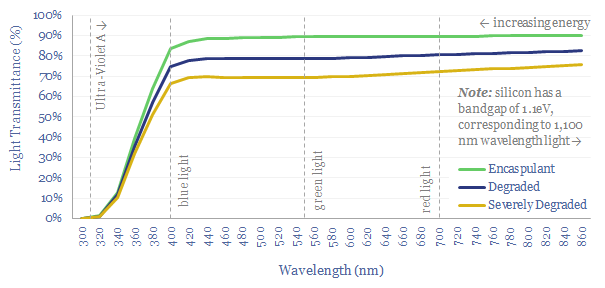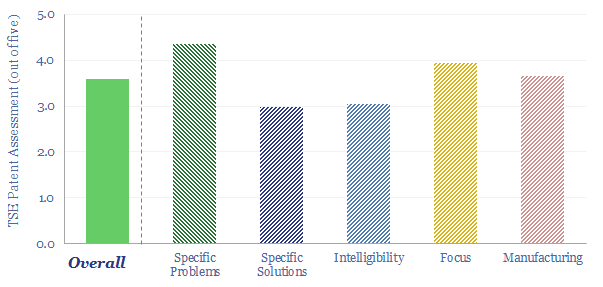Solar encapsulants are 300-500μm thick films, protecting solar cells from moisture, dirt and degradation; electrically insulating them at 4 x 10^15 Ωcm resistivity; and yet allowing 90% light transmittance. The industry is moving away from commoditized EVA towards specialized blends of co-polymers and additives. Is there a growing moat around Mitsui Chemicals’ solar encapsulants?
Mitsui Chemicals traces its origins back to 1912, employs 19,000 people globally, and is listed in Tokyo. The company has featured in our work before, as 15-20% of revenues are derived from polyurethanes, where we think the rise of electric vehicles could free up cheap feedstocks and raise polyurethane margins.
Another view in our recent research is that new energies are entering an age of materials, where there is less running room to achieve deflation via ‘scaling up to mass manufacturing’. Materials are increasingly important. Solar and battery manufacturers will increasingly be willing to pay premia for advanced materials that improve efficiency.
Consistent with this thesis, Mitsui Chemicals is restructuring its films business in 2023-24, spinning out a packaging films business, and concentrating upon films and industrial films, combined into a new, wholly owned subsidiary called Mitsui Chemicals ICT Materials Inc, which is envisaged to become a “third pillar of earnings” across the company.
Solar encapsulants. The role of 300-500μm thick encapsulant layers is to encase solar cells, protect them from humidity, dirt/dust, damaging UV, electrically insulate them and ‘cushion’ them from damage or vibration against the rigid overlying glass and rigid underlying back-sheet. However, typical encapsulants only transmit 90% of the light through the solar module, and they are prone to degradation and delamination.

Ethylene vinyl acetate has historically dominated the solar encapsulant market, and retains a >50% market share in 2023. However, polyolefin encapsulants (POE) and mixed EVA-POE-EVA encapsulants (EPE) have been gaining share, as they protect better against degradation. Reasons are explained in the data-file.
Based on the patent library, Mitsui Chemicals’ solar encapsulant offering is clearly focused on alpha-olefin co-polymer encapsulants, plus additives to improve their processibility, longevity and ultimately the performance of solar modules.
Please download the data-file for our conclusions into Mitsui Chemicals solar encapsulants (and the market more broadly), based on reviewing relevant patents, to assess whether the company has a growing moat in this space, as well as more broadly, in the new age of materials.
